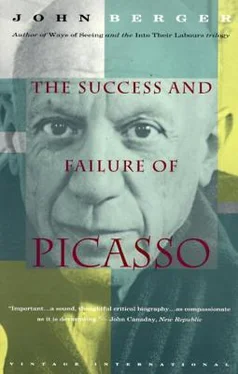What I want to establish is that the Spanish middle class, among whom Picasso was brought up, had — even if they wore the same clothes and read some of the same books — very little in common with their French or English or German contemporaries. Such middle-class virtues as there were in Spain were not created of necessity : if they existed, they were cultivated theoretically. There had been no successful bourgeois revolution. In an absolutist state the middle class had no independent power and so the virtues of initiative, industriousness, non-conformism, thrift, scientific curiosity, had no reason to exist. On the contrary the history of the Spanish middle class had encouraged the very opposite traits. The Inquisition had insisted upon the most rigid orthodoxy, both religious and racial: Jews and Moors were considered inferior races: a violent and hieratic snobbery had been developed. Equally, the state bureaucracy had discouraged initiative and put a premium on safe laziness. It came to be thought that to work hard was to lose one’s dignity. The energy of the Spanish middle class was turned to ritual, which bestows on events a significance gathered from the past and precludes innovation or the thought of it.

6 Easter procession in Lorca
Yet at the same time it must be remembered that Spaniards had not paid the price of progress as it was being paid in France or England. The wealthiest among them were land-owners, not bankers. As a class they served the Church, the estates, the army, and the absolute monarchy; they did not serve capital. This meant that their lives, although very provincially circumscribed, were not depersonalized and made anonymous by the power of money. (The cash nexus, which Carlyle was thundering against in England in the 1840s, does not exist in Spain even now.) It also meant that their class enemy was the peasantry, not a proletariat. A proletariat has to be outwitted and tricked; peasants can mostly be ignored and occasionally intimidated by force. Consequently, the Spanish middle classes were not forced to be hypocritical: they were not trapped between their professed morality and what they needed to do to survive. Because there was no class they had to trick, they could at least be honest to themselves. Within strict limits, they could be proud and independent and could trust their own emotions. (This partly explains why Spaniards have the reputation in the rest of Europe of being so ‘passionate’.)
Spain then was separate. Its economy was predominantly feudal. The memories and hopes of its peasants were pre-feudal. Its large and unusual middle class, whilst maintaining many apparent connexions with contemporary Europe, had still not made the equivalent of a bourgeois revolution. The tragedy of Spain lay (and still lies) in this historical paradox. Spain is a country tied on an historical rack — the symbolic equivalent of its own Inquisition’s instrument of torture. It is stretched between the tenth and the twentieth centuries. Between them there have not arisen, as in other countries, those contradictions which can lead to further development: instead there is unchanging poverty and a terrible equilibrium.
The typical modern political movement in Spain was anarchism. As a youth in Barcelona, Picasso was on the fringes of this movement. The anarchism that took root in Spain was Bakunin’s variety. Bakunin was the most violent of the anarchist thinkers.
Let us put our trust in the eternal spirit which destroys and annihilates only because it is the unsearchable and eternally creative source of all life. The urge to destroy is also a creative urge.
It is worth comparing this famous text of Bakunin’s with one of Picasso’s most famous remarks about his own art. ‘A painting’, he said, ‘is a sum of destructions.’
The reason why anarchism is typical of Spain and why it achieved a mass following in Spain to a degree which it achieved nowhere else, is that, as a political doctrine, it also is stretched on an historical rack. It connects social relations as they once were under primitive collective ownership with a millennium in the future which is to begin suddenly and violently on the Day of Revolution. It ignores all processes of development and concentrates into a single, almost mystical moment or act all the powers of an avenging angel born of centuries of endured and unchanging suffering.
Gerald Brenan, in his excellent book, The Spanish Labyrinth, records the following incident during the Civil War:
I was standing on a hill watching the smoke and flames of some two hundred houses in Malaga mount into the sky. An old anarchist of my acquaintance was standing beside me.
‘What do you think of that?’ he asked.
I said, ‘They are burning down Malaga.’
‘Yes,’ he said, ‘they are burning it down. And I tell you, not one stone will be left on another stone — no, not a plant not even a cabbage will grow there, so that there may be no more wickedness in the world.’
This is typically Spanish: the belief that everything — the whole human condition — can be violently and magnificently changed in one moment. And the belief has arisen because nothing has changed for so long, because in the end the Spaniard is forced to believe in a magical transformation in which the power of the will, the power of the wishes of men still uncomplicated by the moral nuances of a civilization in which each hopes to save himself first, can triumph over all material conditions, can triumph over the slow accumulation of new productive means which in reality is the only condition of progress. The terrible equilibrium of the rack produces from time to time a terrible impatience.
There is also an economic logic to the old anarchist’s outburst as he looks down at Malaga. (This logic does not necessarily enter his own considerations for he has long deserted logic — as any of us might if tied to the rack.) This is the logic of the fact that the Spanish ruling class have established nothing, have built nothing, have discovered nothing that can be of the slightest use to the peasants who are overthrowing them. Expropriate the expropriators! But here the original expropriators have added nothing to what they expropriated. There is only the bare land. This can once again be cultivated by a primitive collectivist commune. Everything else is useless — and therefore luxury and corruption are better burnt.

7 Spanish peasants returning from market
In such a situation it is inevitable that revolutionary energy becomes regressive: that is to say aims at reestablishing a more primitive but juster form of social relations, which frees men from human slavery but precludes them from the possibility of freeing themselves from the slavery of nature.
Picasso’s painting Guernica is said to be a protest against modern war, and is even sometimes claimed to be a kind of prophetic protest against nuclear war. Yet at the time when Guernica was razed to the ground by German Junkers and Heinkel bombers, most of the anarchists in Andalusia who had collectivized the land were unable to ‘expropriate’ a single piece of agricultural machinery. Such is the rack.
Yet, you may say, Barcelona is not Andalusia; Barcelona is an industrial city and so surely the anarchism in which Picasso was involved was different? Superficially it was different. Picasso read Nietzsche and Strindberg. 4The circle in which he moved was considerably influenced by Santiago Rusiñol, a painter and critic, who had issued the following fin-de-siècle order of the day:
Читать дальше














